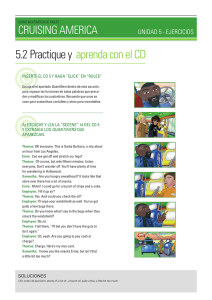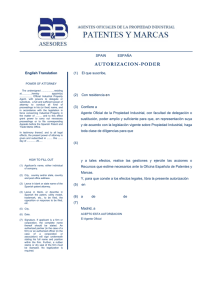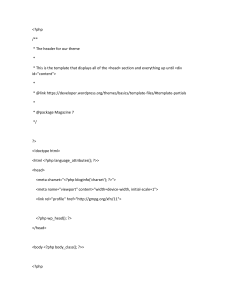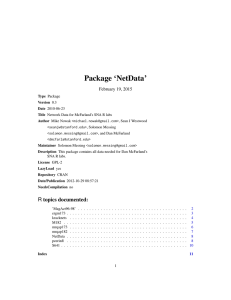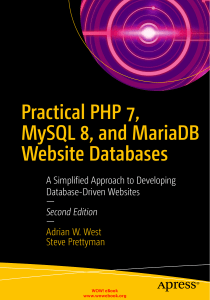Dear parents, Find below a summary of the topics which we will
Anuncio
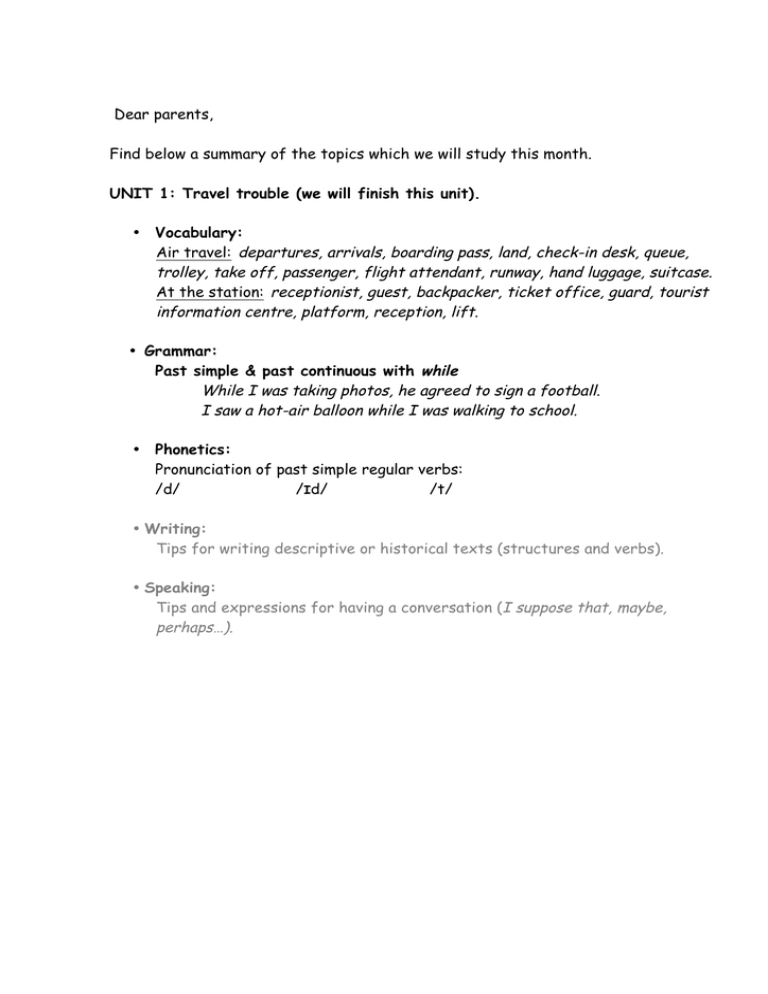
Dear parents, Find below a summary of the topics which we will study this month. UNIT 1: Travel trouble (we will finish this unit). • Vocabulary: Air travel: departures, arrivals, boarding pass, land, check-in desk, queue, trolley, take off, passenger, flight attendant, runway, hand luggage, suitcase. At the station: receptionist, guest, backpacker, ticket office, guard, tourist information centre, platform, reception, lift. • Grammar: Past simple & past continuous with while While I was taking photos, he agreed to sign a football. I saw a hot-air balloon while I was walking to school. • Phonetics: Pronunciation of past simple regular verbs: /d/ /Id/ /t/ • Writing: Tips for writing descriptive or historical texts (structures and verbs). • Speaking: Tips and expressions for having a conversation (I suppose that, maybe, perhaps…). UNIT 2: Sports and hobbies • Vocabulary: Sports vocabulary: archery, gymnastics, fencing, athletics, water polo, trampolining, martial arts, net, rope, racket, hoop, crash mat, badminton, tennis. Hobbies: sing in a choir, do circus skills, collect cards, belong to a sports club, go to drama class, do photography, do needlework, make models. • Grammar: Present perfect & past simple questions Have you ever played tennis? When did you go play tennis? Present perfect: for & since How long has she done gymnastics? I have done gymnastics for two years. since last year. • Writing: Tips for writing biographical texts (“extreme adjectives” for emphasizing texts). • Speaking: Tips for cooperative learning. Discussing ideas with your schoolmates. UNIT 3: Healthy habits (we will start this unit) • Vocabulary: Food: an avocado, beans, beef, a chilli pepper, cinnamon, corn, garlic, prawns, a lime, an onion, peanuts, turkey, guacamole, lemonade and vocabulary about shapes, textures & tastes of food. Everyday activities: drink fizzy drinks, do exercise, drink water, eat fruit and vegetables, eat junk food, spend time on the computer, rest, go for walks. • Grammar: Countable nouns: too & enough There are too many tomatoes/ There aren’t tomatoes enough. Uncountable nouns: too & enough There is too much rice. There isn’t rice enough. Modal verbs for necessity: need to, don’t need to, needn’t I need to eat more fruit. You needn’t/don’t need to jog every day. Modal verbs for obligation, prohibition and advice You must eat fruit every day (obligation). You mustn’t drink too much coke (prohibition). You should do regular exercise (advice). • Writing: Tips for writing texts with arguments for and against an idea (connective words or phrases like firstly, secondly, however, on the one hand, on the other hand, etc.). • Speaking: Speaking tips. Using notes and questions for having a conversation about an specific topic. Adverbs of time. At home you can help your child learn the vocabulary by working on some/all of these activities: • Ask them to talk about the last time they took a plane/train with you. • Ask them to describe any historical event they have learnt in their History lessons. • Ask them to tell you about their last weekend: What they were doing on Saturday afternoon and what happened in the meantime • Ask them about their hobbies or the sports they like doing. • Ask them to tell you how long they have been doing an activity. • Ask them to investigate the biography of any famous person they like. • Ask them to tell you about the activities they usually do in their daily routine. • Ask them to talk about food using too/enough with countable/uncountable nouns. • Ask them to mention some obligations, prohibitions or advices they have at school (use the following modal verbs: must/ mustn’t/ should). You may also find great ideas for activities and materials on the following websites: http://www.elihinkel.org/tips/tenses.htm https://learnenglish.britishcouncil.org/es http://www.perfect-english-grammar.com/present-simple-present-continuous-1.htm http://www.perfect-english-grammar.com/present-simple-use.html http://www.perfect-english-grammar.com/present-continuous-use.html http://www.perfect-english-grammar.com/past-simple-past-continuous-exercise-1.html http://www.perfect-english-grammar.com/past-continuous-use.html http://www.perfect-english-grammar.com/past-simple.html https://www.youtube.com/watch?v=j32SurxnE4s http://www.englishpage.com/minitutorials/countable-uncountable-nouns.htm http://www.myenglishpages.com/site_php_files/grammar-lesson-too-enough.php http://www.myenglishpages.com/site_php_files/grammar-exercise-too-enough.php http://www.ejerciciodeingles.com/ejercicios-distinguir-too-much-too-many-enough/ http://www.usingenglish.com/quizzes/108.html http://www.tolearnenglish.com/exercises/exercise-english-2/exercise-english-99390.php http://www.englisch-hilfen.de/en/exercises/modals/must_not_need_not.htm http://www.englishexercises.org/makeagame/viewgame.asp?id=2786 Estimados padres, A continuación pueden encontrar un sumario de los contenidos que estudiaremos durante este mes., UNIDAD 1: Travel trouble (se dará por finalizada esta unidad) • Vocabulario: Air travel: departures, arrivals, boarding pass, land, check-in desk, queue, trolley, take off, passenger, flight attendant, runway, hand luggage, suitcase. At the station: receptionist, guest, backpacker, ticket office, guard, tourist information centre, platform, reception, lift. • Gramática: Past simple & past continuous with while While I was taking photos, he agreed to sign a football. I saw a hot-air balloon while I was walking to school. • Fonética: Pronunciación de –ed en los verbos regulares de pasado simple: /d/ /Id/ /t/ • Escritura: Consejos para escribir textos descriptivos o históricos (uso de determinadas estructuras y verbos adecuadas para este tipo de escritos). • Conversación: Consejos y expresiones para mantener conversaciones (I suppose that, maybe, perhaps…). UNIDAD 2: Sports and hobbies • Vocabulario: Sports vocabulary: archery, gymnastics, fencing, athletics, water polo, trampolining, martial arts, net, rope, racket, hoop, crash mat, badminton, tennis. Hobbies: sing in a choir, do circus skills, collect cards, belong to a sports club, go to drama class, do photography, do needlework, make models. • Gramática: Present perfect & past simple questions Have you ever played tennis? When did you go play tennis? Present perfect: for & since How long has she done gymnastics? I have done gymnastics for two years. since last year. • Escritura: Consejos para escribir un texto biográfico (“adjetivos extremos” para enfatizar expresiones). • Conversación: Consejos para un aprendizaje cooperativo. Discutir ideas y opiniones con los c compañeros de clase. UNIDAD 3: Healthy habits (se comenzará esta unidad) • Vocabulario: Food: an avocado, beans, beef, a chilli pepper, cinnamon, corn, garlic, prawns, a lime, an onion, peanuts, turkey, guacamole, lemonade and vocabulary about shapes, textures & tastes of food. Everyday activities: drink fizzy drinks, do exercise, drink water, eat fruit and vegetables, eat junk food, spend time on the computer, rest, go for walks. • Gramática: Sustantivos contables: too & enough There are too many tomatoes/ There aren’t tomatoes enough. Sustantivos incontables: too & enough There is too much rice. There isn’t rice enough. Verbos modales para “necesidades”: need to, don’t need to, needn’t I need to eat more fruit. You needn’t/don’t need to jog every day. Verbos modales para “obligaciones, prohibiciones y consejos” You must eat fruit every day (obligation). You mustn’t drink too much coke (prohibition). You should do regular exercise (advice). • Escritura: Consejos para escribir textos con argumentos a favor y en contra de una idea (uso de palabras y frases que sirven para estructurar y enlazar las distintas partes del texto: firstly, secondly, however, on the one hand, on the other hand, etc.). • Conversación: Consejos para mantener una conversación en inglés. Notas y preguntas preparadas de antemano para conversar a cerca de un tema específico (uso de adverbios de tiempo). En casa pueden ayudar a su hijo/hija a aprender lo estudiado en clase a través de las siguientes actividades: • Preguntar al niño/a a cerca de la última vez que tomasteis un tren/avión juntos. • Pedirle que describa un acontecimiento histórico que hayan aprendido en la clase de historia. • Preguntar al niño/a por lo que hizo el pasado fin de semana: ¿Qué estaban hacienda el sábado por la tarde y qué pasó entretanto? • Hablar con el niño/a a cerca de los hobbies y deportes que le gustan hacer. • Preguntarles durante cuánto tiempo han estado haciendo una actividad. • Pedirles que investiguen y que os cuenten datos sobre la biografía de algún famoso que les guste. • Preguntarles a cerca de las actividades que suelen hacer durante su día a día. • Pedirles que hablen de comida utilizando “too/enough” con sustantivos contables e incontables. • Preguntarle sobre algunas obligaciones, prohibiciones o consejos que tienen establecidos en su clase o escuela (utilizando los verbos modales: must/ mustn’t/ should). En los siguientes espacios web, también pueden encontrar algunas actividades, materiales y explicaciones gramaticales que son útiles para repasar y reforzar lo aprendido en clase: http://www.elihinkel.org/tips/tenses.htm https://learnenglish.britishcouncil.org/es http://www.perfect-english-grammar.com/present-simple-present-continuous-1.htm http://www.perfect-english-grammar.com/present-simple-use.html http://www.perfect-english-grammar.com/present-continuous-use.html http://www.perfect-english-grammar.com/past-simple-past-continuous-exercise-1.html http://www.perfect-english-grammar.com/past-continuous-use.html http://www.perfect-english-grammar.com/past-simple.html https://www.youtube.com/watch?v=j32SurxnE4s http://www.englishpage.com/minitutorials/countable-uncountable-nouns.htm http://www.myenglishpages.com/site_php_files/grammar-lesson-too-enough.php http://www.myenglishpages.com/site_php_files/grammar-exercise-too-enough.php http://www.ejerciciodeingles.com/ejercicios-distinguir-too-much-too-many-enough/ http://www.usingenglish.com/quizzes/108.html http://www.tolearnenglish.com/exercises/exercise-english-2/exercise-english-99390.php http://www.englisch-hilfen.de/en/exercises/modals/must_not_need_not.htm http://www.englishexercises.org/makeagame/viewgame.asp?id=2786
